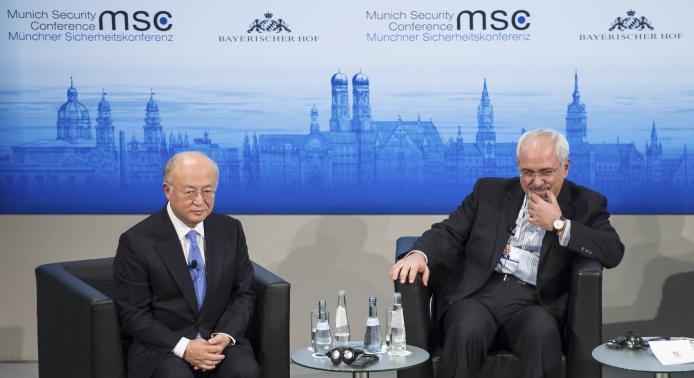 (Reuters) - Iran's foreign minister held rare private talks with his U.S. counterpart on Sunday and said it would be a "disaster" if Tehran did not turn a provisional agreement to defuse a decade-old dispute over its nuclear program into a permanent deal.
(Reuters) - Iran's foreign minister held rare private talks with his U.S. counterpart on Sunday and said it would be a "disaster" if Tehran did not turn a provisional agreement to defuse a decade-old dispute over its nuclear program into a permanent deal.In a sign of the thawing climate between the Islamic Republic and the West, Iran's Mohammad Javad Zarif said he had held bilateral talks with U.S. Secretary of State John Kerry, as well as with other ministers from the six powers negotiating with Tehran, during a three-day security conference in Munich.
His talks looked forward to negotiations starting in Vienna on February 18 when�Iran�and the six powers will attempt over a period of six months to build on an interim agreement on Tehran's nuclear activities to reach a definitive deal.
"What I can promise is that we will go to those negotiations with the political will and good faith to reach an agreement because it would be foolish for us to only bargain for six months," Zarif told the conference after his meeting with Kerry.
"That would be a disaster for everybody - to start a process and then to abruptly end it within six months," he said.
Zarif said�Iran�and the West had an historic opportunity to improve relations. "I think we need to seize it," he said.
Iran insists its nuclear program is entirely peaceful but Western countries have long suspected Tehran of seeking the ability to develop a nuclear weapon.
Under a landmark preliminary deal with the United States,�Russia,�China, Britain,�Franceand�Germany�sealed last November, Iran agreed to halt its most sensitive nuclear operations in return for winning some relief from sanctions.
The deal has lessened the risk of�Israel�or the United States launching a military strike against Iranian nuclear facilities to prevent Tehran acquiring a nuclear bomb.
SANCTIONS
Kerry stressed to Zarif the importance of both sides negotiating in good faith and of Iran abiding by its commitments under the November deal, a U.S. State Department official said.
The United States and the European Union have suspended some sanctions on Iran under the interim deal, but Kerry told Zarif the United States would continue to enforce other sanctions.
Kerry and Zarif have met several times since the election of Iranian President Hassan Rouhani, a relative moderate, last June paved the way for the thaw in ties with the West after years of confrontation and hostile rhetoric.
Zarif said Iran was prepared to address important outstanding questions in the nuclear negotiations but said there was still a lack of trust on both sides, including mistrust among Iranians about the West's intentions.
Zarif told Reuters in an interview on Saturday however that Iran was not prepared to give up research on centrifuges used to purify uranium as part of a final nuclear deal.
Zarif held out an olive branch to�Saudi Arabia, Tehran's regional rival, saying he was ready to start talks at any time with Riyadh on improving relations.
"I believe Iran and Saudi Arabia share a common interest in a secure environment," he said. "Neither one of us will benefit from sectarian divisions, neither one of us will benefit from extremism in this region ... We can work together in order to have a safer neighborhood. There is no need for rivalry."
The head of the United Nations' nuclear watchdog, Yukiya Amano, said possible military dimensions of Iran's nuclear program needed to be clarified and he said his agency also wanted to clarify the issue of small amounts of polonium-210 that had been produced by the Tehran research reactor.
"Polonium can be used for civil purposes like nuclear batteries but can also be used for a neutron source for nuclear weapons. We would like to clarify this issue too," Amano told the Munich Security Conference.
COME CLEAN
Iran struck a separate cooperation pact with the International Atomic Energy Agency last November to be more open about its nuclear activities. The IAEA and Iran are due to meet again in Tehran on February 8 to discuss future measures.
Swedish Foreign Minister Carl Bildt, who is due to visit Tehran soon, urged Iran to "come clean" on its past nuclear activities, saying some intelligence agencies believed Iran had had a nuclear weapons program until early 2003.
U.S. Senator Christopher Murphy, a Democrat, told the conference he did not believe the U.S. Senate would vote on a new Iran sanctions bill. President Barack Obama has threatened to veto any legislation that threatens the talks with Iran.
But Republican U.S. Senator John McCain was more sceptical, saying Iran had a long record of deception.
"There are three components to nuclear weapons - warhead, delivery system and the material itself. They are continuing and cheating on the first two without any constraint whatsoever," he said.
By Reuters
The Iran Project is not responsible for the content of quoted articles.











